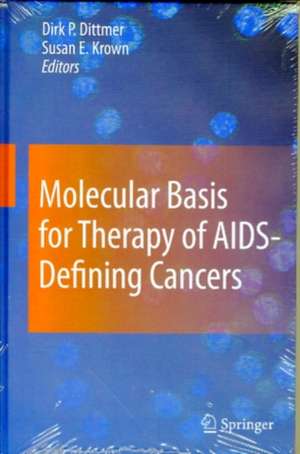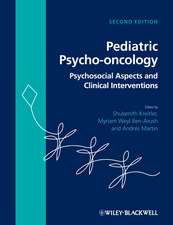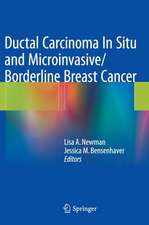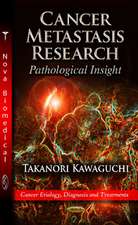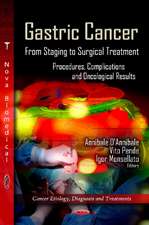Molecular Basis for Therapy of AIDS-Defining Cancers
Editat de Dirk P. Dittmer, Susan E. Krownen Limba Engleză Hardback – 7 iun 2010
Recently, new rational targets for cancer therapy have emerged. But their application to the care of HIV+ patients is slow, because of concerns about the weakened immune status of the patients, because of possible drug interactions with HAART and because some of the AIDS defining cancer are rare.
| Toate formatele și edițiile | Preț | Express |
|---|---|---|
| Paperback (1) | 1092.99 lei 6-8 săpt. | |
| Springer – 5 sep 2014 | 1092.99 lei 6-8 săpt. | |
| Hardback (1) | 1098.27 lei 6-8 săpt. | |
| Springer – 7 iun 2010 | 1098.27 lei 6-8 săpt. |
Preț: 1098.27 lei
Preț vechi: 1156.07 lei
-5% Nou
Puncte Express: 1647
Preț estimativ în valută:
210.20€ • 226.90$ • 176.26£
210.20€ • 226.90$ • 176.26£
Carte tipărită la comandă
Livrare economică 18 aprilie-02 mai
Preluare comenzi: 021 569.72.76
Specificații
ISBN-13: 9781441915122
ISBN-10: 1441915125
Pagini: 200
Ilustrații: XIII, 256 p.
Dimensiuni: 155 x 235 x 21 mm
Greutate: 0.52 kg
Ediția:2010
Editura: Springer
Colecția Springer
Locul publicării:New York, NY, United States
ISBN-10: 1441915125
Pagini: 200
Ilustrații: XIII, 256 p.
Dimensiuni: 155 x 235 x 21 mm
Greutate: 0.52 kg
Ediția:2010
Editura: Springer
Colecția Springer
Locul publicării:New York, NY, United States
Public țintă
ResearchDescriere
Cancer incidences increase in people living with HIV/AIDS. Over 2 million people currently live with HIV/AIDS in the US. This number will increase as HAART prolongs the average lifespan and as (at least in some states) the number of new HIV infections increase again. As this population ages their incidence rates for cancer will increase, as well.
Recently, new rational targets for cancer therapy have emerged. But their application to the care of HIV+ patients is slow, because of concerns about the weakened immune status of the patients, because of possible drug interactions with HAART and because some of the AIDS defining cancer are rare.
Recently, new rational targets for cancer therapy have emerged. But their application to the care of HIV+ patients is slow, because of concerns about the weakened immune status of the patients, because of possible drug interactions with HAART and because some of the AIDS defining cancer are rare.
Cuprins
Foreword -J. Pagano, UNC Linberger Comprehensive Cancer Center Epidemiology of AIDS defining Cancers - D. Whitby, NCI Frederick - J. Martin, UC San Francisco Interferon-alpha therapy for Kaposi sarcoma - Susan E. Krown, Memorial Sloan Kettering Cancer Center Rapamycin and mTOR inhibitors in primary effusion lymphoma and Kaposi sarcoma - B. Damania, UNC Linberger Comprehensive Cancer Center - S. Montaner, U. Maryland Gleevec/cKIT inhibitors in Kaposi sarcoma - Henry Koon, Cleveland Clinic - Ashely Moses, Oregon Health Sciences Center Combating EBV lymphoma by induction of the lytic phase - S. Kenney, U. Wisconsin, Madison Gene therapy of lymphoma and Kaposi sarcoma - C. Boshoff, University College London Nutlin--Targeting p53 in Primary effusion lymphoma P. Ojala, U. Helsinki Metronomic therapy for Kaposi sarcoma - R. Rocheford, SUNY Upstate Inflammatory cytokine dysregulation in AIDS- associated cancers - F. Neipel, U. Erlangen - O. Martinez-Maza, UCLA - J. Nicholas, Johns Hopkins University Cidofovir against Human Papilloma virus –associated cancers J. Palefsky, UC San Francisco; E. Stier, Boston Medical Center Targeting EGFR (Cetuximab) in Human Papilloma virus associated anal cancer Joe Sparano Montefiore Hospital, Bronx, NY Vaccination against human papilloma virus in HIV+ individuals - J. Schiller, NCI Bethesda - D. Lowry, NCI Bethesda Treating Hodgkin lymphoma in the HIV+ patient - R. Ambinder, John Hopkins U. Immunereconstitution syndrome associated cancers - Corey Casper, Fred Hutchinson Cancer Center, U. Washington. - J. Vierra, Fred Hutchinson Cancer Center, U. Washington. Treating AIDS-defining malignances in resource constrained settings - W. Harrington, U. Miami Sylvester Cancer Center - C. vanDerHorst, UNC Chapel Hill Center for AIDS research NFkappaB inhibitors in AIDS-defining Cancers - A. Baldwin, UNC Lineberger Comprehensive Cancer Center - D. Dittmer, UNC Lineberger Comprehensive Cancer Center Clinical trials in the HIV+ population - R. Mitsuyasu, UCLA - R. Little, NCI Bethesda Epidemiology of common non-AIDS-defining cancers in the HIV+ population - E. Engles, NCI Viral Epidemiology branch, Bethesda - J. Lee, U. Alabama Birmingham Clinical manifestations of common cancers in the HIV+ - R. Yarchoan, NCI Bethesda - B. Dezube, Harvard University School of Medicine
Textul de pe ultima copertă
An increased risk for various cancers is a characteristic of people living with HIV infection. Although only three cancers – Kaposi’s sarcoma, high-grade B-cell lymphomas, and invasive cervical cancer – are considered to be "AIDS-defining" conditions, are associated with oncogenic viruses, and occur with increased frequency as immune function declines, other cancer types also occur significantly more frequently in HIV-positive individuals than in the general population, but are not directly associated with clinical progression to AIDS. Notably these "non-AIDS-defining" cancers include virus-associated cancers such as anal cancer, hepatocellular cancer and Hodgkin’s disease, as well as non-virus associated cancers such as lung cancer. Importantly, there are also large worldwide differences in the incidence and behavior of different AIDS-associated cancers.
Although effective combination antiretroviral therapy (cART) may be sufficient in some cases to decrease the incidence or beneficially influence the course of some cancers, in other cases it fails to control cancers in people living with HIV/AIDS. Currently, more than a decade after the widespread introduction of cART, and after major advances in the basic understanding of cancer signaling pathways, we have a unique opportunity to revisit the pathobiology, epidemiology and treatment options for malignancies in people living with HIV/AIDS. Molecular Basis for Therapy of AIDS-Defining Cancers provides a primer on the science of cancer in the setting of HIV infection, as well as examples of novel treatment approaches for HIV-associated neoplasia.
Although effective combination antiretroviral therapy (cART) may be sufficient in some cases to decrease the incidence or beneficially influence the course of some cancers, in other cases it fails to control cancers in people living with HIV/AIDS. Currently, more than a decade after the widespread introduction of cART, and after major advances in the basic understanding of cancer signaling pathways, we have a unique opportunity to revisit the pathobiology, epidemiology and treatment options for malignancies in people living with HIV/AIDS. Molecular Basis for Therapy of AIDS-Defining Cancers provides a primer on the science of cancer in the setting of HIV infection, as well as examples of novel treatment approaches for HIV-associated neoplasia.
Caracteristici
Will provide an update of the latest treatments for AIDS defining cancers, a scientific rationale for established treatments and a review of novel molecularly-targeted treatment options, which have passed pre-clinical testing
Includes supplementary material: sn.pub/extras
Includes supplementary material: sn.pub/extras
